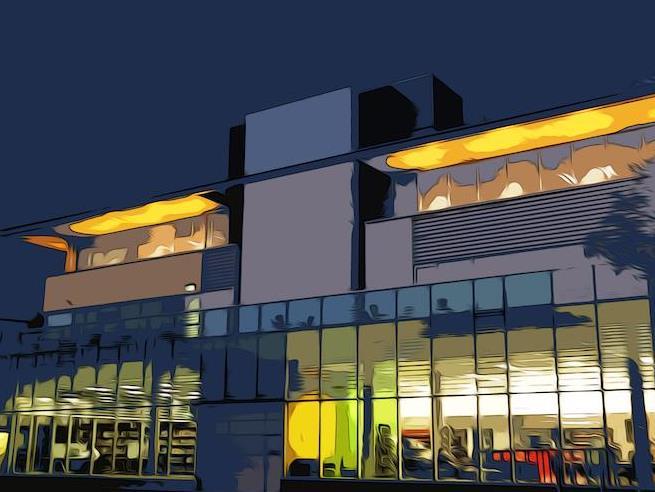Based on a comprehensive industry skills survey conducted earlier in the year, AFTRS has been rebuilding its professional courses. It is also looking carefully at its recruitment process, and re-examining itself from the students’ point of view to make the School as accessible as possible.
As Martin Brown, the Director of Award Courses explained in an interview. ’The young people now coming into professional training are digital natives, who grew up in a very different world. They aspire to emulate a world-class screen sector, while the society and the education system is learning to value creativity. At the same time, they have access to remarkable tools which enable them to create films as part of their ordinary lives.’
‘It used to be that one had a career and that narrowness was a strength. In the old industrial model, the money had to come from the sector itself, and you had to articulate the package on the basis of the script. But now you can develop a project by accumulating an audience.
‘People are developing their projects by writing with their cameras and editing systems, evolving projects by experimenting. And there is not really any one way of working. People are making animations and VFX and interactive projects. They may be doing a Virtual Reality piece.’
‘We were already developing a new suite of courses, but we have been absorbing as much as we can from the industry research to recalibrate the offering,’ said Martin Brown. More than five hundred practitioners contributed to the research, across companies, crafts and industry groups.
‘The headline response is that students need to have more support and courses around the actual business of running a business. They get into media because they love it, and discover that they are also in business.’
While this reality is an element in all the professional courses that AFTRS is developing, starting with the undergraduate BA Screen, Diplomas and Advanced Diplomas, the postgraduate program focuses on specific skills areas.
AFTRS Graduate Certificate courses are designed to fit crucial points in the skills development of people who are strongly committed to working in the screen and broadcast industries. AFTRS expects them to attract people who have a Bachelor’s Degree in a related area, who have been working for a few years and want the opportunity to specialise intensely in a year-long course.
‘There is a suite of eight Graduate Certificates, all of which are part-time and tuned to a particular skills area. They cover business, cinematography, documentary, creative producing, directing, editing, music and screenwriting. At the same time, the School has responded to industry feedback which emphasised the need for people with both a general understanding of the sector, and the ability to co-operate effectively.’
Martin Brown used cinematography as an example. ‘For three quarters of the course you just study cinematography, and in the other quarter you are working collaboratively with the other seven disciplines. So you have a collaborative environment but you also get a depth of training in your specific discipline.’
In radio, the approach is slightly different. Here AFTRS is offering a one year Graduate Diploma course, which is full time.
For the MA Screen program, students will generally be expected to have credits in a specialist area. Said Brown, ‘They now know they want to explore one discipline in greater depth, and we strongly encourage them to think of themselves as creative originators.’
In the past, the MA Screen course has been an intensive one year program which was almost entirely focused on making a film. Now, it will cover two years, considered to be the limit for which working screen professionals can balance a course with their life responsibilities. For AFTRS, this is the level at which the search for excellence is paramount, aiming to ‘nurture the next generation of visionary storytellers who can work at the highest level of the Australian screen and broadcast industries’, according to the course information.
AFTRS MA Screen will be offered in eleven disciplines, with six places in each discipline, with all the benefits of small classes and intensive access to discipline experts. They are built around cinematography, documentary, producing, directing, editing, music, production design, screenwriting, sound, VFX and 3D animation and interactive media.
Students are expected to work with other people in the School on their projects. They will spend fifty percent of their time in a collaborative environment with students from the other ten disciplines, and the other fifty percent working deeply with their own practice.
‘In the first year,’ said Brown, ‘students will work on a combination of their own and external briefs from someone else’s ideas. An editor, for instance will have an opportunity to write, to direct and conduct small iterative experiments.’ With that broader experience, students in semester three will work on a number of major projects, in which they form collaborative teams. In semester four, they have an opportunity to reflect, analyse, deconstruct and work on a placement with industry.’
AFTRS has quietly turned its Master of Arts Screen & Business into a key research program for the sector, using many of the most enquiring and experienced production professionals who wanted to step back and reflect on their own practice. That focus on business knowledge is now spread across the School, but the course has been retained as the Master of Arts Screen: Business and Leadership course.
At the same time, the School is determined to ensure that the diversity of the student body reflects the makeup of our society.
‘We have to make sure the recruitment process we use is producing graduates that mirror the composition of Australian society and that they will go out with the skills they need. Starting at entry level and working their way up.
‘It’s been very interesting to make sure we are not putting barriers in place to stop determined people who would otherwise be students of the School.’
The School has moved away from the traditional written approach to applications. ‘It is a very standard academic instrument to write in correct prose, but it is not a useful tool to identify people who take screen or broadcast courses,’ he said.
‘Rather than asking for a formal resume, we ask applicants to tell us the story of who they are, as they would chose to reveal themselves. The story that lead you to where you are today, so we are finding people who are natural storytellers.’
In parallel to the graduate strand, the School is offering a range of Diploma and Advanced Diploma courses, which are focused on people who can demonstrate ability and are looking for that first industry job, or moving up the professional path.
From all these strands, said Brown, ‘We hope our graduates are highly employable and will be snapped up, and that the makeup of the sector will start to reflect Australian society a bit more – we’ve just got to make sure we make that possible.
‘It is an agenda to be passionate about – it is very inspiring. We all live for passionate students with a story to tell. When you can help people to do that, it is about as rewarding as it can get for a teacher.’
AFTRS is running a general Open Day on Saturday 10 September from 10am to 4.30pm. Visitors can discuss the full suite of programs, explore the resources, and see the place in action. The day will also be live-streamed on the website and Facebook.
On 21 September, from 6-8pm, the School is running a Postgraduate Information Evening, which will also be live-streamed on the website and Facebook.
Here is a list of all the post-graduate courses on offer:
Graduate Certificates (1 year part time)
- Graduate Certificate Screen: Business
- Graduate Certificate Screen: Cinematography
- Graduate Certificate Screen: Documentary
- Graduate Certificate Screen: Creative Producing
- Graduate Certificate Screen: Directing
- Graduate Certificate Screen: Editing
- Graduate Certificate Screen: Music
- Graduate Certificate Screen: Screenwriting
Graduate Diploma (1 year full time)
- Graduate Diploma in Radio
MA Screen: Business and Leadership (2 years, Part Time)
MA Screen (2 years, Full time) Offered in 11 disciplines;
- MA Screen: Cinematography
- MA Screen: Documentary
- MA Screen: Producing
- MA Screen: Directing
- MA Screen: Editing
- MA Screen: Music
- MA Screen: Production Design
- MA Screen: Screenwriting
- MA Screen: Sound
- MA Screen: VFX & 3D Animation
- MA Screen: Interactive Media





